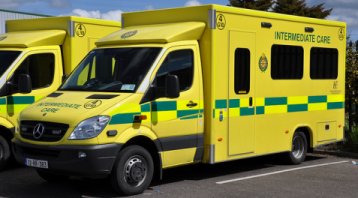Model of Care
The national service model must be integrated within the broader healthcare system and should evolve from existing services for pre-hospital emergency care and critical care. This is to ensure maximum utilisation and benefit from any enhancement of infrastructure.
The National Ambulance Service (NAS) is to move away from the dedicated Ambulance approach currently used by MICAS and the NNTP and integrate provision of Ambulance support for Retrieval/Transfer to the wider provision of Ambulance support for inter-facility transfers.
NNTP - Currently there is an integrated model across three Dublin hospitals who take it in turn to provide a Nurse, an NCHD for 7 days, daytime one week in three, to Retrieve or Transfer patients to and from hospitals in and outside of Dublin.
Paediatrics – Currently there is no service model. Regional Hospitals mostly carry out their own individual Transfers.
Adults – Currently there is an integrated model across four Dublin hospitals, who take it in turn to provide a Nurse, an NCHD for 5 days, daytime Monday to Friday, one week in four, to Retrieve and Transfer patients to and from hospitals in and outside of Dublin.
Proposed Service Model
A service model has been proposed that encompasses Adult, Paediatric and Neonatal Retrieval/Transfer. Data as exists has been analysed and the experience of other jurisdictions examined to estimate the likely requirements as follows:
- Clinical governance structures and practices are being implemented to aid improvement in quality, efficiency and cost effectiveness of the National Transport Medicine Programme, ensuring best patient outcomes
- The programme will outline roles, responsibilities and competencies for all clinical personnel involved in Retrievals and Transfers
- The programme will ensure authority, accountability and responsibility for all members of the National Retrieval Teams
- The establishment of a National Retrieval Coordination Desk
- The establishment of a single phone line for all Retrieval requests
- The establishment of a National ‘live’ Bed-Bureau
- The establishment of Intermediate Care Ambulance provision for inter hospital Retrievals and Transfers. This aligns with a long awaited and much needed current initiative by NAS to separate ‘999 Emergency’ Ambulance provision from inter-facility ‘Intermediate Care’ Ambulance provision
|
|
Quality Metrics and the National Framework
The service model needs to be supported by national agreed policy and standardised procedures ranging from high level governance to detailed equipment and medication lists. These will include:
- Development of policies, protocols and procedures in transport medicine
- Standardisation of equipment for ground and air transport nationally
- Standardisation of transport documentation nationally
- Development and provision of outreach education nationally that supports the programme objectives
- Development of Key Performance Indicators (KPIs) and audit
- Development of robust reporting and response to adverse events in transport
- Adherence to National Standards (e.g. HIQA)
The Future
An efficient and clinically effective national Retrieval/Transfer system is a prerequisite to supporting the successful implementation of:
- Hospital reconfiguration
- the Clinical Programmes
- the Small Hospitals Framework, and
- the Hospital Groups Strategy.
Essentially Retrieval/Transfer is about optimising utilisation of national health services.
The aim is to ultimately develop a high quality Retrieval/Transfer system that is accessible to patients and Hospitals dispersed across Ireland, and has the capacity to transport several patients simultaneously.
With the establishment of good data collection on all Retrievals and Transfers of high acuity patients nationally, the business case for the extent and detail of the expansion and enhancement of the developing National Retrieval/Transfer Service will become apparent.

|